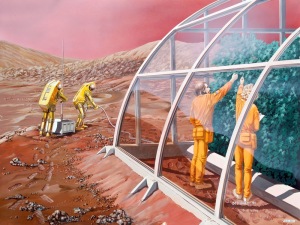
Set in 2095, in a world in which humanity’s grossly insufficient response to climate change caused the collapse of the global ecosystem, Earth became uninhabitable for human beings. This forced the exodus of humanity to Mars; therefore, the mission of the committee was to act as the “Martian United Nations” for the colonizing peoples. Throughout the weekend, this body and its delegates were asked to respond to threats like dust and solar storms, health problems caused by low gravity, incoming asteroids, and even anti-colonization terrorists. Delegates were the leaders of colonies sent to Mars by twenty-two Earth nations, and each colony was initially composed of citizens from a single nation.
The crisis staff challenged delegates to think outside of the traditional paradigms of International Relations and design solutions to these problems. Many times delegates sent design drawings with actual measurements and provided us with creative and inventive ideas to resolve the situations thrown at them. In one occasion, they even provided legitimate and accurate calculations for actually deflecting an asteroid out of the path of Mars. In another, they drafted the flight plans for ships made of their own design being launched via a space elevator to ferry humanity to Mars. Yet despite escaping to another world and forming a body meant to create a new human civilization, delegates fell to the baser instincts of human beings and the realities of realpolitik and created and used military force to accomplish some of their policy goals, ultimately destroying many perfectly habitable cities and all their citizens.

MUN introduces people from 12-year-olds to 22-year-olds from across the world to different ideas and ways of thinking, it forms well-rounded and informed citizens. At a MUN conference or in a MUN club, conducting scientific committees and debates introduces people to a completely new way of thinking, and to ideas they may have never considered. However, we live in a time marked as much by our blinding scientific accomplishment as by our incredible ability to be willfully ignorant; whether it be climate change and its deniers or evolution and creationism.. Dr. Carl Sagan may have said it best:
I know that science and technology are not just cornucopias pouring good deeds out into the world…. The sword of science is double-edged. Rather, its awesome power forces on all of us, including politicians, a new responsibility — more attention to the long-term consequences of technology, a global and transgenerational perspective, an incentive to avoid easy appeals to nationalism and chauvinism. Mistakes are becoming too expensive.
It is more important now than ever to introduce to people the way that scientists and engineers think. Where uncomfortable truths are okay. Where there are solutions if you look hard enough to find them. Where we use the human capacity for creativity and analytical thought to build a brighter future for humanity across the ages. The world arrived to where it is today through the efforts of scientists and engineers throughout history, as much as leaders and politicians, and it will continue as such. Ultimately, it is equally important to understand the scientific way of thought as much as the political and in the search for that understanding, MUN is the perfect medium


